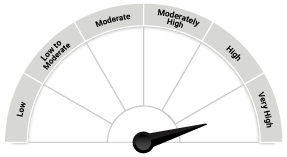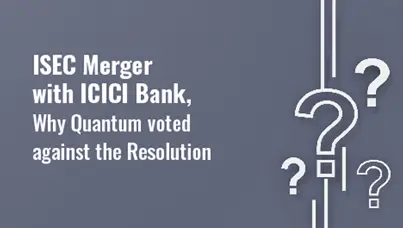Equity monthly view for December 2021
Posted On Tuesday, Jan 11, 2022
The year 2021 started with a sense of hope with an expectation of end game for pandemic & related economic woes with the proliferation of the vaccines. Little did we know that 2021 had in store for us a bigger Covid-19 wave (or perhaps Tsunami is a better word). April-21, May-21 & June-21 again saw lock downs & restrictions on mobility albeit less severe than the previous one in 2020. Post the month of June, restrictions were eased & economic activity picked up again. The fag end of the year has again increased anxieties about a possible third wave due to the ‘Omicron’ variant. Overall, from an economical perspective, the year started with low demand, low inflation & low-interest-rate environment & is ending with a supply constraint & high inflation environment with expectations of the global interest rate rising in 2022.
Amidst all this ‘gloom, boom & doom’ the S&P CNX Sensex has given a return of 20.6% YTD as on_30th Nov 2021. The broader markets have performed even better with BSE Midcap & Small Cap returning 39.1% & 55.6% respectively as on 30th Nov 2021. From a sectoral performance perspective power, metal & real estate sectors were the leaders this year & FMCG, Pharma & Auto were the laggards.

Source: RBI
‘This indicates primary producers (commodity, energy & food producers) have regained their purchasing power which they enjoyed in the pre-GFC era or to an extent between 2010-14. In this environment, non-integrated businesses will be in a disadvantageous position compared to integrated ones. Similarly, FMCG & second or third order chemical derivative companies who have benefitted from benign input costs since 2014 will face higher margin pressure going forward. It will also test the ‘high quality therefore high valuation’ hypothesis of some of the market participants.
The question then arises, about the sustainability of this pricing power of primary producers. Is it driven by short term supply chain challenges or there is a structural story to it? The answer is ‘both’. While some of the supply constraints are due to global supply chain dislocations, there has been clear underinvestment in capacity creation in these businesses. The prices have been unremunerative for the past few years & the focus of global capital has moved towards ESG compliant businesses (most of the commodity production does not pass the strict definition of clean & green). A good example is global upstream CAPEX in Oil & Gas which fell from ~$800bn in 2014 to ~$350bn in 2020 and is expected to grow marginally in 2021. Further, disruption in people & goods movement due to Covid-19 in the last 2 years has resulted in further delays in under-construction capacities impacting supply.
Even in the Indian context, there has been clearly under-investment in capacity creation in some of the core industries at a time when demand for some of these products is expected to grow at a multiplier to real GDP growth for many years to come.
| India Capacity | CAGR | ||
|---|---|---|---|
| 2011 | 2021 | ||
| Cement (MMTPA) | 287 | 521 | 6% |
| Refining (MMTPA) | 193 | 250 | 3% |
| Major Pet Chem (MMTPA) | 15 | 19 | 2% |
| Urea (MMTPA | 22 | 28 | 2% |
| Steel (MMTPA) | 78 | 144 | 6% |
The second tectonic shift is the increase in the cost of money. We can retire the term ‘Transitory Inflation’’. This recent statement by U.S Federal Reserve hastens up the road map for a reversal of easy liquidity environment, in place for the last eighteen months This is perhaps the first time in close to a decade when the U.S federal Reserve has acknowledged inflation as a concern. While there could be different views on timing on when interest rates move up but there is a near-unanimous move that it will move up. This will have a bearing on equity globally. As the world of easy liquidity goes away, and risk-free rates go up across spreadsheet models, return expectation (discounting rates) will also go through a reset.
As with bonds with higher duration, stocks trading at elevated valuations are more sensitive to interest rate changes because they discount cash flows further out in the future. A reasonably valued portfolio of stocks is expected to outperform vs. an expensive portfolio in this environment. The following illustration will help understand the concept better.
| Company A | Company B | |
|---|---|---|
| Year 1 Cash Flow | 10 | 10 |
| Growth Rate | 10% | 5% |
| No of Years Future Cashflows is discounted (P.E) | 10 | 5 |
| Intrinsic Value at 12% discounting rate | 82 | 39 |
| Intrinsic Value at 14% discounting rate | 75 | 37 |
| Fall in Intrinsic Value due to increase in interest rate | -9% | -5% |
Company A grows at 10% every year for 10 years & is valued at 10x PE & company B grows at 5% for the same period & is valued at 5x P.E. For a 2% increase in interest rates the drawdown in value of Company A is almost double compared to company B.
Finally, going into 2022 Investors should also be cautious about popular & hot themes like Electric Vehicles, Consumer Tech & FinTech. While all these are expected to play out well over the long term, some of the underlying stocks are factoring in too much good news & are at bubble territory valuations with no positive cashflows insight for the next few years. On the contrary, it would be wise to look for stocks and portfolios with a contrarian approach.
Quantum Long Equity Value Fund’s portfolio has been built through a bottom-up research process & is tilted towards cyclicals. It is valued at 12.9x FY24E earnings vs the S&P BSE Sensex valuations of 18.8x FY24E earnings. The portfolio is stress-tested periodically to ensure the investee companies have the wherewithal to survive the down cycle.
Summing up, Investors should not be unnerved by the near-term volatility steadily move towards their optimum equity allocation as per the long-term financial goals through systematic investment plans. Any sharp correction due to near-term headwinds can offer additional valuation comfort and should be used to allocate more to equities with a long-term perspective. Our 12--20-80 (12 x monthly expense in a liquid fund, 20% of the remaining allocation in gold & rest 80% in equities) approach towards asset allocation is best suited to navigate near term volatility in different asset classes and achieve the best possible result for achieving long term financial goals
Data source: NSDL
| Name of the Scheme | This product is suitable for investors who are seeking* | Risk-o-meter of Scheme | Risk-o-meter of Benchmark |
| Quantum Long Term Equity Value Fund (An Open Ended Equity Scheme following a Value Investment Strategy) Primary Benchmark: S&P BSE 500 TRI | • Long term capital appreciation • Invests primarily in equity and equity related securities of companies in S&P BSE 200 index. |  Investors understand that their principal will be at Very High Risk |  |
*Investors should consult their financial advisers if in doubt about whether the product is suitable for them.
The Risk Level of the Scheme in scheme Risk O Meter is basis it's portfolio as on December 31, 2021.
The Risk Level of the Benchmark Index in the Risk O Meter is basis it's constituents as on December 31, 2021.
Disclaimer, Statutory Details & Risk Factors:
The views expressed here in this article / video are for general information and reading purpose only and do not constitute any guidelines and recommendations on any course of action to be followed by the reader. Quantum AMC / Quantum Mutual Fund is not guaranteeing / offering / communicating any indicative yield on investments made in the scheme(s). The views are not meant to serve as a professional guide / investment advice / intended to be an offer or solicitation for the purchase or sale of any financial product or instrument or mutual fund units for the reader. The article has been prepared on the basis of publicly available information, internally developed data and other sources believed to be reliable. Whilst no action has been solicited based upon the information provided herein, due care has been taken to ensure that the facts are accurate and views given are fair and reasonable as on date. Readers of this article should rely on information/data arising out of their own investigations and advised to seek independent professional advice and arrive at an informed decision before making any investments.
Mutual fund investments are subject to market risks read all scheme related documents carefully.
Please visit – www.quantumamc.com to read scheme specific risk factors. Investors in the Scheme(s) are not being offered a guaranteed or assured rate of return and there can be no assurance that the schemes objective will be achieved and the NAV of the scheme(s) may go up and down depending upon the factors and forces affecting securities market. Investment in mutual fund units involves investment risk such as trading volumes, settlement risk, liquidity risk, default risk including possible loss of capital. Past performance of the sponsor / AMC / Mutual Fund does not indicate the future performance of the Scheme(s). Statutory Details: Quantum Mutual Fund (the Fund) has been constituted as a Trust under the Indian Trusts Act, 1882. Sponsor: Quantum Advisors Private Limited. (liability of Sponsor limited to Rs. 1,00,000/-) Trustee: Quantum Trustee Company Private Limited. Investment Manager: Quantum Asset Management Company Private Limited. The Sponsor, Trustee and Investment Manager are incorporated under the Companies Act, 1956.
Related Posts
-

World Health Day: Build a Healthier Portfolio with Quantum ESG Best-in Class Strategy Fund
Posted On Friday, Apr 05, 2024
As we celebrate World Health Day on April 7th, it's a timely reminder of the importance of wellness in all spheres of our lives.
Read More -

Equity Monthly View for March 2024
Posted On Friday, Apr 05, 2024
S&P BSE Sensex grew by 1.59% in the month of March 2024. S&P BSE Midcap Index increased by 0.01% & S&P BSE Small cap Index declined by -4.8% respectively.
Read More -

ISEC Merger with ICICI Bank, Why Quantum voted against the Resolution
Posted On Friday, Mar 22, 2024
Since its Inception in March 2006, Quantum Long Term Equity Value Fund has been focused on generating sensible
Read More
Get In Touch
Take small steps in your financial planning to achieve big dreams! Start your investment journey today!



